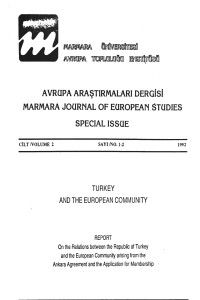Öz
The membership of the EC has a profound effect upon the states and individuals
since it constitutes a distinct legal order at once different from and common to the
countries which form the Community. It entails adaptation of the national, political,
economic and social systems to the common rules enshrined in the founding Treaties.
The original Six member states had to adjust their constitutions to the obligations
arising from the membership and, as the Community developed, they continued the
process of adaptation, Newcomers have to do the same though they do not influence
the events. Therefore, the greater the European integration, the more complex
becomes the process of adaptation of new members. This will be particularly
difficult as a result of the completion of the internal market by the end of 1992 and the
progressive development of new policies and the ratification of the Treaty of Maastricht
of 1992.
Anahtar Kelimeler
Kaynakça
- -
Öz
The membership of the EC has a profound effect upon the states and individuals
since it constitutes a distinct legal order at once different from and common to the
countries which form the Community. It entails adaptation of the national, political,
economic and social systems to the common rules enshrined in the founding Treaties.
The original Six member states had to adjust their constitutions to the obligations
arising from the membership and, as the Community developed, they continued the
process of adaptation, Newcomers have to do the same though they do not influence
the events. Therefore, the greater the European integration, the more complex
becomes the process of adaptation of new members. This will be particularly
difficult as a result of the completion of the internal market by the end of 1992 and the
progressive development of new policies and the ratification of the Treaty of Maastricht
of 1992.
Anahtar Kelimeler
Kaynakça
- -
Ayrıntılar
| Birincil Dil | İngilizce |
|---|---|
| Bölüm | Makaleler |
| Yazarlar | |
| Yayımlanma Tarihi | 29 Aralık 1992 |
| Yayımlandığı Sayı | Yıl 1992 Cilt: 2 Sayı: 1&2 |


